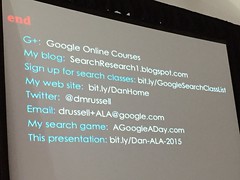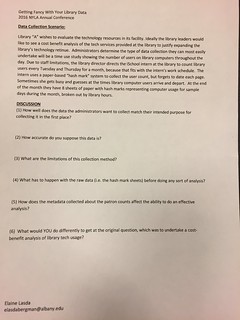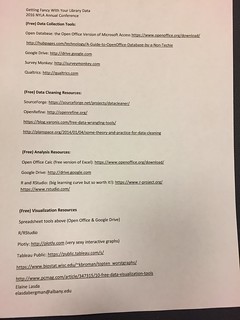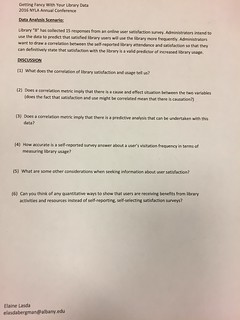 |
| Photo from NIH Library |
Dr. Daniel Russell works for Google. He is a Senior Research Scientist focused on Search Quality and User Happiness. He
describes himself as a cyber-tribal-techno-cognitive-anthropologist.
He is both a research scientist and a software engineer. His web site is
https://sites.google.com/site/dmrussell His presentation is available
here. His presentation went quickly, so the notes below are incomplete, but may provide information that you might not glean from the slides themselves. .
He
said that we adapt the technology we're using for whatever we're trying
to find at the time. That technology changes the way we think and how
we interact with information.
Learning to use the tools, for example:
- Using google translate in a novel setting
- Finding help on academic assignments
What do we need to know about finding information in the Internet age?
Students use google to answer simple questions. More difficult questions go to the reference desk.
The card catalogue was a static index. Indexes now are more flexible because they are digital.
Knowing cultural convention genres/media helps you define the questions.
We need to be able to find tools that help us define the question, e.g., Metadata EXIF viewers.
He noted that people need executive skills which will keep them on task, and not get distracted.
As searchers, we need to know what is possible.
Informacy:
- The literacy of information
- Knowing what the information is...
- How to use and interact with the information
- Knowing how to use information in "hand to hand" combat
Finding text on a page is fundamental online reading skill.
- Survey of 2225 US-English Internet users, 90.5% do not onion how to "find" on a page.
- 51.1% of 545 US-English Internet using teachers do not know how to "find" on page.
Spoof
sites, e.g., Pacific Northwest Tree Octopus. Sadly students don't have
enough life information to help them spot spoof sites.
We live in a time when extraordinary videos need extraordinary evidence. We need to know if a video could be true.
Emoticons and abbreviations can get in the way of understanding the question or understanding the answer.
Google image search will allow you to upload an image and search using it.
We live in a world where content change, and can radically change quickly.
YouTube
- every minute 200+ hours of video are uploaded. 3 billion videos are
watched each day. 70% of the traffic is international.
1.8 papers are published in ~28,000 journals. What percentage are vampire journals?
Where are you supposed to learn these literacy skills?
The underlying information space is growing. More answers are available.
The
creation of time lapse videos made by taking many photos of the same
location, The photos are sorted by time before the video is made.
Assembling the collocation on content.
Question everything and be curious. Do one more search! Many things are trivial to look them up, so do look them up!
We need to learning how to ask questions. It has always been a skills. Now it's a critical skill.
Dig into who owns a web site. Check the address. Who else uses that address?
There is a web site that allows you to clone an article and then alter the article.
We have vastly more content, but what is its quality?
Basic skills include:
- Learn how to ask the right questions.
- Know what tools are available.
Informate:
- Understand space of information available
- Can search effectively
- Can understand how to interpret the results
How to become informate:
- Take a class...continue to learn more
- Become more aware
- Subscribe to
- Understand
- Play a serious game
- Teach a class
He has an a class online, Power Searching with Google. Check his web site for other resources. The site also contains a link to his blog.

Dr. Russell's contact info
 One of my favorite NYLA sessions continued to be "I STILL Don't Want to Talk About it". This year the expert panel included Gerald Nichols, Lisa Rosenblum, and Mary Jean Jakubowski. Prior to the session, the panelists solicit problems from public libraries, which are then anonymized and used during the session. They specifically seek out problems related to staff and patrons. During the session, they used those problems to talk about solutions which often include advice on needed library policies. It is always a fascinating and educational setting.
One of my favorite NYLA sessions continued to be "I STILL Don't Want to Talk About it". This year the expert panel included Gerald Nichols, Lisa Rosenblum, and Mary Jean Jakubowski. Prior to the session, the panelists solicit problems from public libraries, which are then anonymized and used during the session. They specifically seek out problems related to staff and patrons. During the session, they used those problems to talk about solutions which often include advice on needed library policies. It is always a fascinating and educational setting.





